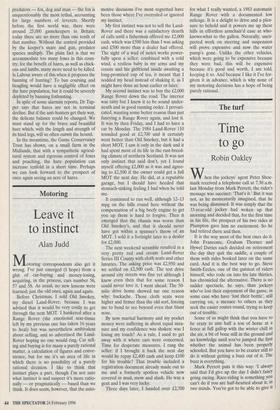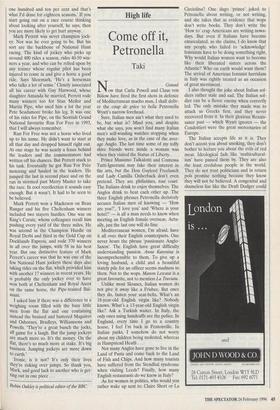The turf
Time to go
Robin Oakley
When the jockeys' agent Peter Shoe- mark received a telephone call at 7.30 a.m. last Monday from Mark Perrett, the rider's message was succinct: 'That's it.' But it was not, as he momentarily imagined, that he was being dismissed. It was simply that the 33-year-old jockey had woken up that morning and decided that, for the first time in his life, the prospect of his two rides at Plumpton gave him no excitement. So he had retired there and then.
It is the way most of the best ones do it. John Francome, Graham Thorner and Hywel Davies each decided on retirement the day they quit the saddle, a couple of them with rides booked later on the same card. And it is the best way to go. Steve Smith-Eccles, one of the gutsiest of riders himself, who rode on into his late thirties, has chronicled the alternative. There is no sadder spectacle, he says, than jockeys who've lost their enjoyment of the game, in some case who have 'lost their bottle', still carrying on, a menace to others as they seek the easier routes round, trying to keep out of trouble.
Some of us might think that you have to be crazy to aim half a ton of horse at a fence at full gallop with the winter chill in the air, a bit of bone still in the ground and no knowledge until you've jumped the first whether the animal has been properly schooled. But you have to be crazier still to do it without getting a buzz out of it. The buzz is everything.
Mark Perrett puts it this way: 'I always said that I'd give up the day I didn't fancy going racing. Race-riding is something you can't do if you are half-hearted about it, in two minds. You've got to be able to give it one hundred and ten per cent and that's what I'd done for eighteen seasons.' If you start going out on a race course thinking about looking after yourself, he says, then you are more likely to get hurt anyway.
Mark Perrett was never champion jock- ey. Nor was he ever going to be. But his sort are the backbone of National Hunt racing. The kind of jockey who picks up around 400 rides a season, rides 40-50 win- ners a year, and who can be relied upon by any trainer whose regular pilot has been injured to come in and give a horse a good ride. Says Shoemark, 'He's a horseman who talks a lot of sense.' Closely associated all his career with Guy Harwood, whose daughter Amanda he married, Perrett rode many winners too for Stan Mellor and Martin Pipe, who used him a lot the year Pete Scudamore broke his leg. It was one of his rides for Pipe, on the Scottish Grand National favourite Run For Free in 1993, that I will always remember.
Run For Free was not a horse who lived up to his name. He didn't want to start at all that day and dropped himself right out. At one stage he was nearly a fence behind the leaders and the commentators had written off his chances. But Perrett stuck to his task. Eventually he got Run For Free motoring and hauled in the leaders. He jumped the last in second place and on the run in stormed past Merry Master to take the race. In cool recollection it sounds easy enough. But it wasn't. It had to be seen to be believed.
Mark Perrett won a Mackeson on Beau Ranger and his five Cheltenham winners included two stayers hurdles. One was on King's Curate, whom colleagues recall him pushing every yard of the three miles. He was second in the Champion Hurdle on Royal Derbi and third in the Gold Cup on Docklands Express, and rode 370 winners in all over the jumps, with 58 in his best year. But one distinctive feature of Mark Perrett's career was that he was one of the few National Hunt jockeys these days also taking rides on the flat, which provided him with another 17 winners in recent years. He is probably the only jockey ever to have won both at Cheltenham and Royal Ascot on the same horse, the Pipe-trained Bal- asani.
I asked him if there was a difference in a weighing room filled with the busy little men from the flat and one containing Instead the bruised and battered Maguires and Osbomes, Bradleys, Williamsons and Powells. 'They're a great bunch the jocks, all game for a laugh. But the jump jockeys are much more so. It's the money. On the flat, there's so much more at stake. It's big business. Jumping jockeys are more down to earth.'
Ironic, is it not? It's only their lives they're risking over jumps. So thank you, Mark, and good luck to another who is get- ting out in one piece ...
Robin Oakley is political editor of the BBC.



























































 Previous page
Previous page